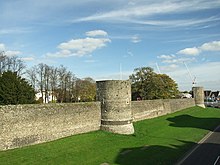James Hales
| Sir James Hales | |
|---|---|

Canterbury city walls, just outside which Sir James Hales' manor of The Dungeon was situated
|
|
| Born | c. 1500 |
| Died | 1554 (aged 53–54) Thanington, Kent |
| Spouse(s) | Mary Hales Margaret Wood |
| Children | Humphrey Hales Edward Hales Mildred Hales |
| Parent(s) | John Hales, Isabel Harry |
Sir James Hales (c. 1500–1554), English judge, was the son of John Hales (1469/70–1540?), Baron of the Exchequer. He refused to seal the document settling the crown on Lady Jane Grey, and during the reign of Queen Mary opposed the relaxation of the laws against religious nonconformity. His suicide by drowning resulted in the lawsuit 'Hales v. Petit', considered to be a source of the gravedigger's speech in Shakespeare's Hamlet.
James Hales was the eldest son of John Hales (1469/70–1540?), Baron of the Exchequer, of The Dungeon or Dane John,Canterbury, Kent, by Isabel or Elizabeth Harry. He had three brothers and a sister:
Hales' father was a bencher of Gray's Inn, and Hales was admitted as a student there between 1517 and 1519. He was elected an ancient of the Inn in 1528. By 1530 he was acting a counsel in the Court of Requests, and in 1532 became a bencher of Gray's Inn. In 1541 he was appointed counsel to the corporation of Canterbury, and was an adviser to Archbishop Thomas Cranmer. On 4 November 1544 he was appointed King's Serjeant, and shortly thereafter King Henry VIII granted him the manor of Clavertigh in Elham, Kent. At the coronation of King Edward VI on 20 February 1547 he was made a Knight of the Bath. On 20 May 1549 he received a patent as a Justice of the Common Pleas.
Hales supported the Protestant reformation, and in February 1551 was among those who gave sentence of deprivation against Bishop Stephen Gardiner. However, in 1553 he was one of three judges who refused to seal the document by which John Dudley, 1st Duke of Northumberland, and others attempted to settle the crown on the Protestant Lady Jane Grey. When Queen Mary came to the throne shortly thereafter, and greater tolerance towards Roman Catholics was expected, Hales pointed out in a charge to a jury at the Kent assizes that the current statutes against nonconformity had not yet been relaxed, and that the jury must find according to the law as it then stood. On 4 October 1553 the Queen granted Hales a renewal of his patent as a Justice of the Common Pleas, but when he came before the reinstated Bishop Gardiner, then Lord Chancellor, Gardiner refused to take Hales' oath as a justice, and had him committed in turn to the King's Bench prison, the Counter in Bread Street, and the Fleet. Hales was imprisoned for several months, during which time attempts were made to have him conform to Catholicism. He eventually complied, but after doing so, attempted to commit suicide with a penknife. In April 1554 Queen Mary ordered that Hales be released, and he is said to have been brought to her presence and given "words of great comfort". By then, however, his mental condition was so unsettled that on 4 August of that year, while staying at Thanington near Canterbury with his nephew, he drowned himself by lying face down in a stream. A coroner's inquest determined that his death, being self-inflicted, was a felony.
...
Wikipedia
